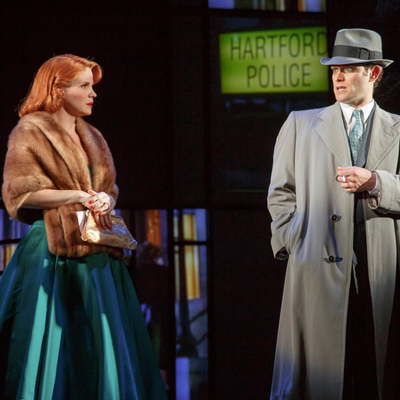
Maybe what I’m about to say I’m only saying because I’ve been away too long (I’m back today from a three-month leave), but: Dear God, is the American musical in trouble or something? Worse still: Is it possible that a doggedly overwrought, diligently misconceived, nobly self-nullifying mini-opus like Far From Heaven is actually doing more damage to the form than slapdash commercial pap does? Pop trash doesn’t have capability’s power to repel, after all. It takes megatalents the size of Michael Greif, Scott Frankel, Michael Korie, and Richard Greenberg — working with a flawless cast and what appears to be near-perfect musical source material, filmmaker Todd Haynes’s clever-but-never-too-clever, surprisingly heartfelt deconstruction of the Douglas Sirk weepie — to create a vacuum of these handsome dimensions, where all the signature gestures, musical and dramaturgical, serve only as you-are-here guidestars to the show’s vast shallows. “God, I hate musicals,” spat my seatmate, a lifelong theater lover. And as a regular defender of the form, I couldn’t gainsay her. I could only paraphrase Jack Nicholson in As Good As It Gets: “Well, we were drowning out here, and that show was describing the water.”
Or maybe there’s some subtle audience participation going on. After all, everyone is drowning in Far From Heaven, from Kelli O’Hara’s painfully perfect Hartford housewife Cathy, to her tormented, closeted husband Frank (Steven Pasquale), to the defiantly optimistic black gardener Raymond (Isaiah Johnson) with whom Cathy forms a forbidden bond. After that set up, I think it’s high time we discussed the parameters of camp. Over to you, Frankel and Korie:
It’s autumn in Connecticut
Ablaze in red and gold
When heaven made Connecticut
I swear they broke the mould
The place and reason why
The season was invented for
That picture postcard found in every news and candy store
Right out our door
It’s Connecticut
Let’s just ignore the tooth-grinding “reason why the season was invented for” and concentrate on the overall tone here — like, what the hell is it, exactly? Sounds just a chromosome or two away from “Good Morning Baltimore” on paper. But no. The specter of John Waters is kept strenuously, strenuously at bay by a furrowed, tenebrescent self-seriousness, evident in every design element, from the lighting to the score. (Frankel channels the same energies of creamy treacle and jagged jazz tapped by Elmer Bernstein in his Far from Heaven film score, only with far less ecstasy and emotional abandon. There’s a studied quality to every meticulously placed note, and the same holds for Korie’s often sharp but cumulatively laborious rhymes, which are lavished primarily on commonplaces, scenic description, and catalogs of Eisenhower-era cliché.) Greenberg’s book follows the movie’s beats faithfully, but the story feels stripped to its skivvies, denuded of perspective, humor, subversion.
Some heart remains, though, thanks primarily to O’Hara and Pasquale, whose sincerity and dedication to these characters pays off. (Actors should always default to sincerity; the same rule, however, does not apply to writers and directors.) Johnson turns in a fine performance, but he reads a little young — and not in a way that delivers the Rock Hudson–Jane Wyman frisson I suspect the creative team was aiming for. Nothing kindles between him and O’Hara. The repression just doesn’t press. With the swelling strings of our love story clipped, we’re left with a palette of Technicolor grief, enforced by Greif, who trucks out his trademark fleet of rolling fire escapes and actor-size battery-cages. We’re also force-fed a series of Saturday Evening Post covers via LED screens he and scenic designer Allen Moyer have arranged in a backdrop Mondrian. The irony undergirding all of this is so disciplined, it’s strangling itself. And in service of what, exactly? What is this police state of joylessness protecting? I know there’s a reason why musical comedy is an awards category, while musical drama is more of an admonition on par with “caution: haze, strobe lights, gunshots,” but even by lowered standards, Far From Heaven is notably inert. Todd Haynes, dealing only in beauty and ecstasy, waterboarded us with the desperation of the fifties, even as he poked fun at it from afar. This show, achingly resisting an intrinsic camp it might have found creative ways to embrace, presents us with a pile of fading postcards. With regrets, I return to sender.
Far From Heaven is at Playwrights Horizons’ Mainstage Theater through July 7.

